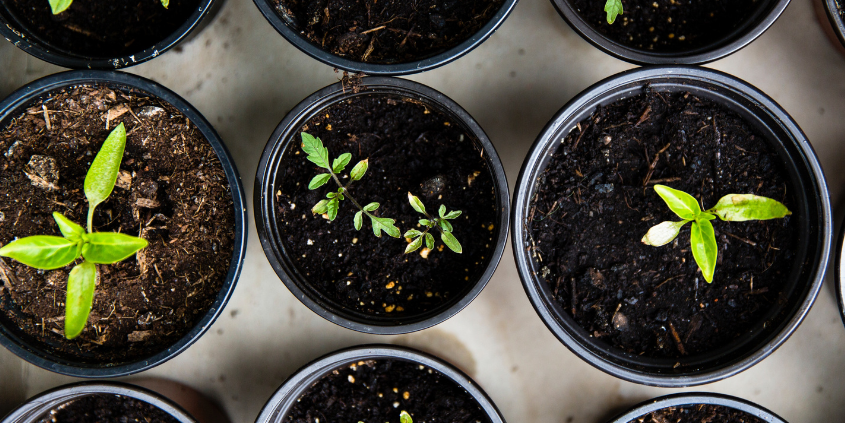Gardening as a Lifestyle Medicine Practice
By Donovan Giang, Maya Shetty, and Rusly Harsono, MD
Life hastens while we focus on our goals, and this can be overwhelming and stressful. Let’s find balance and evaluate our lifestyle! Do you feel like you are eating healthy or connecting well with people around you on a consistent basis? Home and Community Gardening may help you and your family to get there. Home gardening is the practice of growing plants in a traditional outdoor garden or a kitchen garden using pots or trays inside our home. Community gardening, on the other hand, involves gardening in a space shared by the community. Studies showed that both forms of gardening have several health benefits, from improving nutrition to social connection.
Home Gardening Impact on Nutritional Health
Carney et al in 2013 reported that adults and children’s vegetable intake “several times a day” increased significantly from 18.2% to 84% (p<0.001) and from 24% to 64% (p = 0.003) respectively following a community-based participatory research project that enrolled 163 household members in a community-based gardening project to assess food security, safety and family relationships.
Researchers from the University of California, San Francisco in 2020 provided insight into how home gardening may improve nutritional health and facilitate better health behaviors. This qualitative study explored changes in health behavior following the implementation of a home gardening and nutritional education program in an urban community at high risk for cardiometabolic disease. Participants from low-income, Latino / Latina population in Santa Clara County were provided with home gardening supplies and attended 10 educational workshops to learn about nutrition, as well as gardening skills and healthy recipes. After a year of gardening, participants reported increased consumption of fresh produce, shifted toward home cooking, and decreased fast food consumption. Participants attributed these changes to the affordability, convenience, flavor, and freshness of their grown produce, as well pride in their garden.
Gardening and Social Connection
One of the most significant benefits associated with gardening is the circle of sharing that promotes connection within a local community. As individuals start their own gardens in their home or as part of a community garden, the act of sharing with those around them can build friendships, leading to continued social interaction, trust, and reciprocity. A qualitative research study in 2004 titled “Growing urban health: Community gardening in South-east Toronto” demonstrated these benefits among community gardeners. The researchers collected data from active community gardener participants on their experiences through direct observation, focus groups discussions, and in-depth interviews. Participants reported greater attachment to their community, more positive social interactions, and stronger relationships due to their community gardening experience. A participant of the study even described the joy from being able to share home-grown produce with friends, suggesting community gardens may also help strengthen social connections beyond the boundaries of one’s neighborhood.
Through stronger social relationships and a growing sense of joy in gardening, gardeners have more opportunities to inspire those around them to start their own gardens. Carney et al (2013) reported this effect with home gardeners. In this study, the researchers provided support and resources for participant families, who were mostly of a Hispanic and farm working background, to start their own home gardens. Through pre- and post-gardening questionnaires and interviews, the researchers found that not only did a significant proportion (94.9%) of participants report an improvement to their family’s health but also many of these participants (92.3%) encouraged other families to start gardens as well. As a result, one individual’s gardening can blossom into a rewarding community effort.
Nutrition and social engagement are key to support a healthy lifestyle. Researchers reported that through gardening we can improve our lifestyle medicine practices in at least these two pillars: healthful nutrition and social engagement. Boles et al in 2021 reported that targeting mindsets about the process of health behaviors have meaningful implications for individuals’ engagement in healthy behaviors. Gardening can transform the process of eating healthy into fun through opportunity to relax, expressing creativity and connecting with others.
Let’s try gardening for yourself, try collaborating with your neighbors or larger community to create a shared garden! Home gardening in your backyard or kitchen countertop is a great way to start living healthy. Hydroponic gardens recently have become popular to allow indoor gardening without dirt all year round. No matter which form of gardening you do, take the opportunity to try something new and maintain a healthy lifestyle!
References:
- Boles, Danielle Z., et al. “Can Exercising and Eating Healthy Be Fun and Indulgent Instead of Boring and Depriving? Targeting Mindsets About the Process of Engaging in Healthy Behaviors.” Frontiers in Psychology, vol. 12, Oct. 21, pp. 1-14., https://doi.org/10.3389/fpsyg.2021.745950
- Carney, Patricia A., et al. “Impact of a Community Gardening Project on Vegetable Intake, Food Security and Family Relationships: A Community-Based Participatory Research Study.” Journal of Community Health: The Publication for Health Promotion and Disease Prevention, vol. 37, no. 4, Aug. 2012, pp. 874–81., https://doi.org/10.1007/s10900-011-9522-z.
- Eng, S., et al. “Healthy Lifestyle Through Home Gardening: The Art of Sharing.” American Journal of Lifestyle Medicine, vol. 13, no. 4, July 2019, pp. 347-350–350., https://doi.org/10.1177/1559827619842068.
- Palar, Kartika, et al. “Nutrition and Health Improvements After Participation in an Urban Home Garden Program.” Journal of Nutrition Education and Behavior, vol. 51, no. 9, Oct. 2019, pp. 1037–46., https://doi.org/10.1016/j.jneb.2019.06.028.
- Sarah Wakefield, Fiona Yeudall, Carolin Taron, Jennifer Reynolds, Ana Skinner, Growing urban health: Community gardening in South-East Toronto, Health Promotion International, Volume 22, Issue 2, June 2007, Pages 92–101, https://doi.org/10.1093/heapro/dam001























